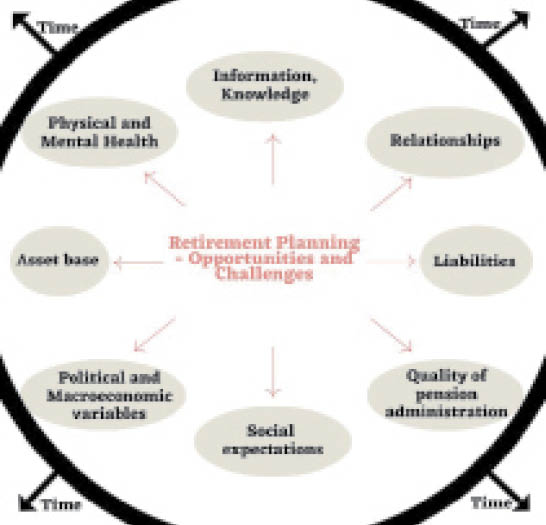Retirement Planning – The Transition Imperative (II)
Last week we commenced this series by introducing how as human beings we go through continuous changes and the characteristics of those changes. We will conclude o…

Retirement Planning – The Transition Imperative
“The future is something which everyone reaches at the rate of sixty minutes an hour, whatever he does, whoever he is.”
— C.S. Lewis
Last week we commenced this series by introducing how as human beings we go through continuous changes and the characteristics of those changes. We will conclude on that argument today as it relates to retirement.
As a young banker several years ago, I visited an elderly uncle who was a senior executive in a large corporation in his office. My uncle is of the lower end of Chief Olusegun Obasanjo’s generation, who was the country’s president at the time. For my generation, members of the Obasanjo generation have always loomed larger than life, strongly determining our affairs for decades.
My uncle probably saw my admiration of his official status, and he mentioned that it was only ‘a matter of time’ and ‘you’ (meaning my generation) would take over from ‘us’ (meaning his generation). I don’t think I believed my uncle at the time because the Obasanjo generation seemed almost immortal! But he was right. Within two decades of the statement, members of my generation have been everything from GMs, EDs, MDs/CEOs in the private sector to governors, ministers, military generals, and presidents in the public sector.
The point is that, at least for now, human beings cannot stop the effluxion of time. What tends to happen is that young and older people ‘see’ the passage of time differently. For a young person of twenty-five, another thirty-five years of service is more than 100% of their life. So, it seems ‘infinite’. But for a person in their in their sixties like my uncle, the previous thirty-five years is ‘only’ about 50% of their life. So, looking back it would seem reasonably ‘small’. This sense of timing makes young people just starting out in their careers think there is ‘so much time’ to plan for their retirement. But there isn’t and there is, depending on what we do! On the other hand, the fear of change from the comfortable status quo makes older people somewhat reluctant in facing the reality of their impending retirements and planning robustly for it. Both errors hurt our retirement planning mindset. We need a reality paradigm.
Transition into retirement cannot be stopped; it is an opportunity not everyone gets in life. After all, most individuals about to retire would have lost colleagues to downsizings, dismissals, ill health, bankruptcies, and even death. Hence, we should be grateful, plan to enjoy and be of value in our retirements.
Part of what we need to process the retirement transition is to understand the personal and environmental factors that will influence our planning. Some of these factors can help us whilst others may hurt us unless we address them. Some of the environmental and personal factors, dynamic in time, are as shown below:
Retirement planning factors © Musbahu El Yakub 2023
Information and knowledge: As we mentioned last week, our education and experiences prepare us reasonably well for retirement. In addition, though, we will need to get the information and knowledge needed to build our retirement plans and live wise retirement lives.
Political and macroeconomic variables: Of specific knowledge that the individual planning for their retirement should build is a good understanding of how macroeconomic variables can impact their plan. Inflation and its relationship with the value of our assets and the purchasing power of our fixed incomes and cash flows need to be particularly understood.
Physical and mental health: Several factors affect our mental and physical health during our years of service and in retirement. We need to be aware of our current medical states, our health risks and what we can do to enhance our physical and mental well-being.
Assets and liabilities: The quantum of assets and liabilities we build and carry will determine our retirement incomes and cash flows, and, therefore, the quality of our retirement life.
Social expectations: In our African settings, there are a lot of expectations on people that are privileged to be working in government or running their businesses. The individual planning for their retirement will need to consider this and be realistic about it.
Quality of pension administration: How well our pensions are managed by those charged with the responsibility will bear on the safety of our cash flows in retirement and therefore the quality of our retirement lives.
We need to understand how personal and environmental factors will individually and collectively influence our planning, transition, and life in retirement. While some of them may be ‘out of our direct control’, we need to understand how we can apply those that we can control to help us to shape our transition and life in retirement.
The privilege of transition into retirement is not enjoyed by all people that have worked or ran their businesses. Those lucky enough should be happy about and plan for it. The choice is stark: We can plan and work to be among the 50% of retirees that are happy or, by default, fall into the 50% that are not happy. Next week, we will look at a brief History of Retirement to understand where we are coming from, where we are, and where we may be headed.
